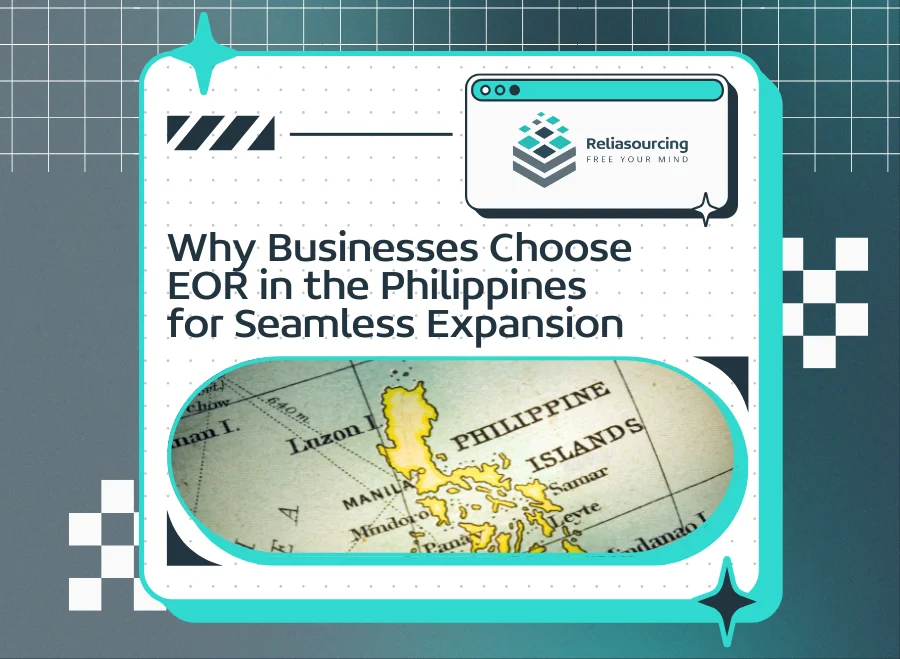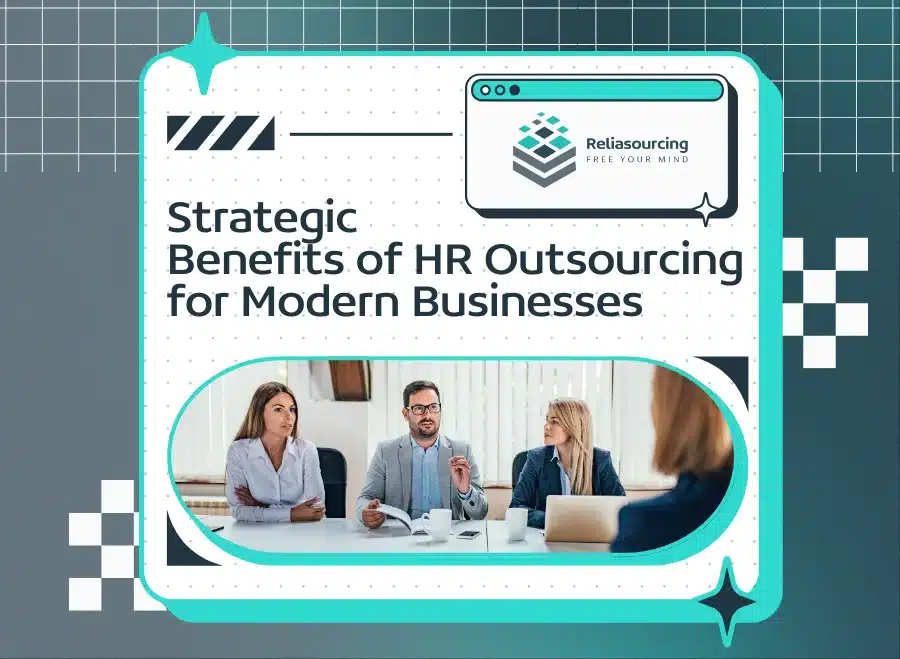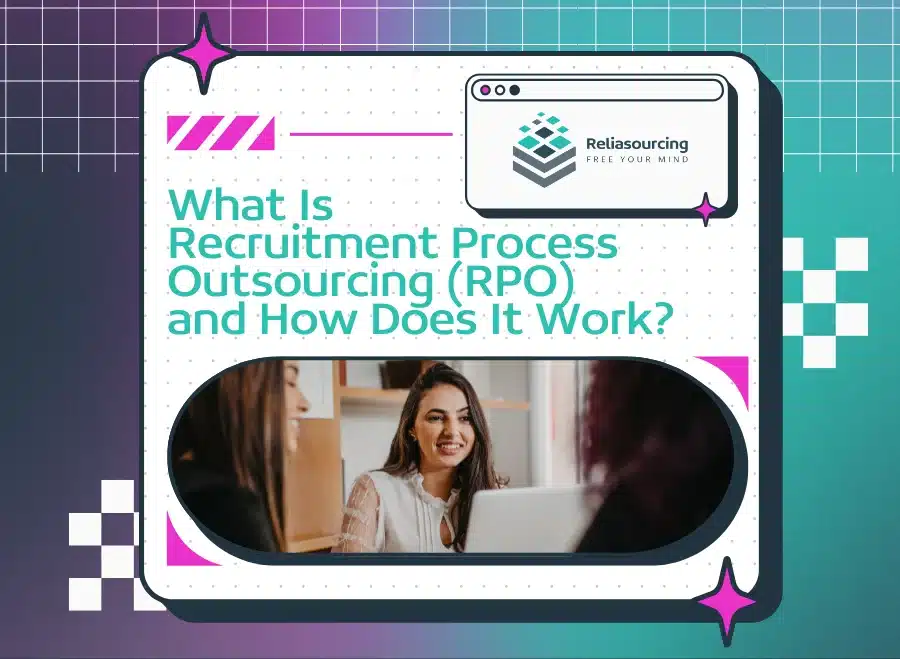Global expansion once meant months of government paperwork delays and costly entity registration, making it an uphill battle with legal and compliance requirements. At present, companies looking to scale quickly into Southeast Asia, especially in the Philippines, are finding that using an Employer of Record (EOR) offers a more efficient route in terms of speed and security.
Business leaders are increasingly turning to EORs to simplify international hiring, all while remaining compliant with local labor laws and accessing skilled talent without having to set up a legal entity. Particularly, the Philippines stands out as an appealing destination for those looking to expand their team. With a workforce known for professionalism, English proficiency, and cultural compatibility with Western markets, the country has evolved into one of the most reliable bases for global business operations.
Read through to find a clear breakdown of how EOR works, why the Philippines offers unique advantages, and how compliance and hiring become more manageable under an EOR arrangement. The article also addresses key questions commonly raised by HR leaders, supported by real-world examples and comparisons that highlight why EOR in the Philippines remains the ideal choice for global expansion.
Understanding EOR and Its Role in Global Expansion
An Employer of Record (EOR) acts as the legal employer for a company’s workforce in another country. The EOR manages payroll, benefits, taxes, and compliance while the client company directs the employee’s day-to-day work. In short, businesses maintain operational control without the administrative burden of establishing a local entity to access local talent.
A traditional entity setup involves incorporation, local registration, tax documentation, and navigating complex employment laws, processes that can take several months and require significant upfront investment. In contrast, partnering with an EOR enables hiring within a matter of weeks. Companies avoid setup costs and reduce compliance risks, gaining immediate access to a ready workforce.
For example, a U.S.-based SaaS company aiming to expand its customer support operations to Asia could hire a team through an EOR in the Philippines. The EOR would handle employment contracts, payroll compliance, and benefits, while the company focuses on training and integrating the new hires into its global support structure.
The model also provides flexibility for businesses testing new markets, whether for scaling a small pilot team or expanding to full operations. EORs remove the administrative barriers that slow down international growth.
Comparing EOR with BPO, PEO, and Virtual Assistants
Many global companies weigh the differences between an Employer of Record, a Business Process Outsourcing (BPO) provider, a Professional Employer Organization (PEO), and hiring Virtual Assistants (VAs). While all models help businesses access talent, their structures and control levels differ significantly, so understanding these distinctions can help determine which model fits your company’s long-term goals.
Key Differences Between EOR, BPO, PEO, and Virtual Assistants
| Model | Legal Employer | Control Over Team | Hiring Speed | Compliance Responsibility | Ideal For |
| Employer of Record (EOR) | The EOR acts as the official employer on record, handling compliance, payroll, and taxes | High – client manages work directly | Fast (2–4 weeks) | EOR ensures full compliance with local labor laws | Companies expanding globally without setting up a local entity |
| Business Process Outsourcing (BPO) | The BPO company employs the staff | Moderate – operations managed by the BPO | Moderate (4–8 weeks) | BPO provider assumes compliance within the service scope | Businesses outsourcing entire functions (e.g., customer support, back office) and looking to upscale their team with training |
| Professional Employer Organization (PEO) | Co-employment model; company shares responsibilities with PEO | High – shared HR and compliance | Moderate | Shared between PEO and client | Established companies with an existing legal entity seeking HR support |
| Virtual Assistants (VAs) | Usually self-employed or contractor-based | Variable – depends on contract terms | Fast (1–2 weeks) | Client assumes all compliance risk | Short-term or task-based needs, often for startups or solopreneurs |
EOR offers the best balance between flexibility and compliance for companies entering new markets. Unlike a BPO, which provides outsourced services, or a VA, which typically operates independently, an EOR model allows for complete operational control of staff while ensuring local compliance.
Why the Philippines is an Ideal Destination for Business Growth
The Philippines continues to rank as one of the most business-friendly countries in Asia for outsourcing and remote hiring. The combination of a skilled workforce, competitive costs, and strong government support for foreign investment has made the nation a top global destination for companies pursuing expansion.
1. Access to a highly skilled and English-proficient workforce
According to the IT and Business Process Association of the Philippines (IBPAP), the country’s BPO/IT-BPM industry reached nearly USD $38 billion in export revenues in 2024 and employed around 1.82 million professionals. The growth reflects continued confidence from international companies investing in Philippine talent.
The workforce’s fluency in English and strong communication skills allow adaptability to different business cultures, making it an ideal extension for global teams. Filipino professionals excel in customer support, finance, IT, design, and development, key functions sought after by expanding firms.
2. Cost efficiency and operational scalability
Labor costs in the Philippines remain significantly lower than in Western economies. The Philippines offers substantial cost savings for labor compared to Western countries, with some sources citing up to 70% savings in outsourcing.
Yet the value extends beyond cost savings. Businesses gain access to infrastructure-ready talent that supports 24/7 operations across time zones. For companies exploring offshore team setups, outsourcing in the Philippines continues to deliver measurable gains in productivity and service quality.
3. Strategic location and strong digital infrastructure
Located at the center of Asia-Pacific trade routes, the Philippines offers proximity to major markets including Japan, Singapore, and Australia. The country’s ongoing investment in digital transformation, under the “eGovernment Masterplan 2028,” aims to expand high-speed internet access and strengthen digital services for businesses.
4. Business-friendly government policies
As the industry contributed to around 9% of the country’s GDP in 2024, government policies offer significant support for the outsourcing industry. Foreign investors also benefit from incentives under the Philippine Economic Zone Authority (PEZA) and the Corporate Recovery and Tax Incentives for Enterprises (CREATE) Act. The policies encourage outsourcing, technology transfer, and sustainable employment, key factors that support EOR models.
How EOR Services Simplify Legal Compliance and Hiring
Compliance remains one of the most challenging aspects of international expansion, as labor laws, payroll taxes, and contractual regulations vary significantly across countries. An Employer of Record helps companies stay compliant while maintaining operational agility.
1. Full compliance with Philippine labor and tax regulations
An EOR in the Philippines ensures compliance with all government-mandated employee benefits, including Social Security System (SSS), PhilHealth, Pag-IBIG, and income tax requirements. The EOR also manages statutory contributions and ensures all filings meet deadlines. The process removes administrative stress and minimizes the risk of penalties or labor disputes.
2. Streamlined hiring and onboarding
Through an EOR, global companies can legally employ Philippine-based talent within days, reaping the benefits that come with offshoring. The EOR drafts compliant employment contracts, manages background checks, and facilitates onboarding, all in accordance with local labor laws and regulations. Businesses retain control of daily operations while their EOR partner handles documentation and HR processes.
3. Payroll management and benefits administration
The EOR ensures accurate and on-time payroll in local currency and administers benefits in accordance with Philippine labor laws, ensuring proper deductions and filings all while maintaining transparency for both employer and employee.
4. Data protection and ISO-certified standards
A reliable EOR adheres to international data privacy frameworks such as the GDPR and the local Data Privacy Act of 2012. Reliasourcing’s operations are backed by active ISO certifications, including ISO 9001:2015 and ISO/IEC 27001:2022, ensuring consistency, security, and quality in management.
FAQ About EOR in the Philippines
Is EOR legal and recognized by Philippine labor laws?
EOR is legal and recognized by Philippine labor laws. The Employer of Record acts as the official employer of record under Philippine regulations, ensuring that employees receive the correct statutory benefits and are protected under national labor codes.
Do I lose control over my employees under an EOR arrangement?
You do not lose control over your employees under an EOR arrangement. Companies maintain full operational authority, including setting KPIs, schedules, and workflows, while the EOR handles legal and administrative responsibilities.
How does payroll, tax, and compliance management work under an EOR setup?
Payroll, tax, and compliance management under an EOR setup are handled in accordance with Philippine laws, as the EOR only processes payroll in local currency, deducts the appropriate taxes and contributions, and ensures compliance with SSS, PhilHealth, and Pag-IBIG requirements.
How does data privacy and protection apply to employees managed under an EOR?
Data privacy and protection apply to employees managed under an EOR, adhering to both local and international regulations. EOR providers, such as Reliasourcing, maintain ISO-certified standards to ensure data security and operational transparency.
Final Thoughts: Scaling Smart with the Right EOR Partner
Expanding into a new market demands careful planning and the right partnerships. The Philippine market offers a rare balance of skilled talent, cost advantages, and a supportive business environment, making it ideal for EOR-driven expansion.
An Employer of Record enables companies to move quickly while staying compliant and minimizing risks. The model supports flexibility, making it easier for startups and enterprises alike to build operations with minimal investment. As global businesses seek trusted partners for scaling in Asia, working with an experienced provider makes all the difference.
Reliasourcing stands out for its deep expertise in the Philippine labor landscape and its experience supporting international clients in SaaS, gaming, fintech, and e-commerce. Our ISO-certified processes ensure that every hire, payroll cycle, and compliance step meets international standards. And with local insight and a global mindset, Reliasourcing helps clients expand confidently and manage their teams seamlessly.
Let’s discuss how Reliasourcing can help you expand seamlessly. Visit Employer of Record Solutions to explore our services. You can also reach out to us via our Contact Us page to begin building a compliant and scalable workforce in the Philippines.









